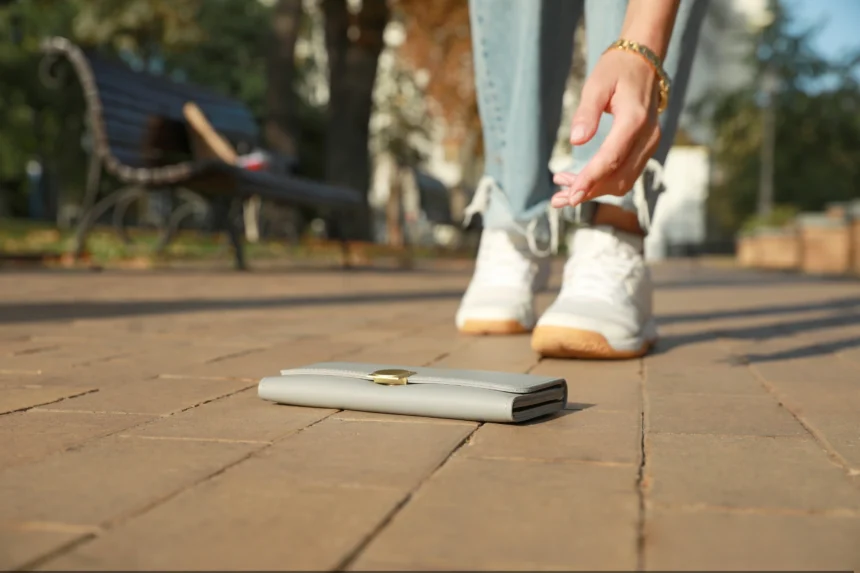It’s that moment when you’re like, “Whoa, lucky me! You’re walking through a busy street and a folded $20 bill catches your eye. Maybe it’s more—a wad of cash lying by a park bench or a crumpled envelope left behind in a shopping cart.
Most of us have been there, tempted by the quiet thrill of free money. But what happens if you just pocket it and walk away? The short answer: you might be breaking the law.
The idea of “finders keepers” is more myth than reality and depending on where you live, holding onto someone else’s lost money could land you in court. The rules are surprisingly strict and they’re rooted in a simple idea: money belongs to someone until proven otherwise.
A Simple Decision That Isn’t So Simple
Take this scene: you’re in a café and you spot a $50 note under a chair. No one nearby claims it. A quick voice in your head says, “Lucky day.” Another voice whispers, “What if someone’s coming back for it?” That’s the exact tension lawmakers expect.
Money isn’t abandoned just because it’s lying around. Under the Theft Act 1968, theft is defined as “the dishonest appropriation of property belonging to another with the intention of permanently depriving the owner of it.”
That means slipping that $50 into your pocket without trying to return it meets every part of that definition.
Sean Joyce, a UK legal authority, summed it up: “The law requires someone who finds property (including cash) to make enquiries as to who the owner is and then make efforts to return it to them where possible.”
Why It’s Called “Theft by Finding”
The phrase sounds strange but “theft by finding” is a legal reality. If you keep lost money without trying to return it, you could be charged. In many places, this is treated no differently than if you had stolen it outright.
Even Reddit users in legal forums are clear about this. One commenter on a popular thread wrote: “Taking and keeping money found on the ground fulfills all those criteria: it is dishonest appropriation; you do not know the owner, so you do not have their consent; and you intend to permanently deprive the owner of the money.”
That’s why the safest move isn’t to slip it into your wallet but to hand it in—to a store manager, security guard or police officer.
What the Law Actually Requires
Every jurisdiction has its own rules but the message is consistent: don’t keep found money without trying to find the owner.
In the U.S., many states require you to turn in found cash to the police, especially if it’s over a certain amount. California, for example, considers keeping anything over $950 without reporting it a felony. In the UK, police stations will log found property and hold it for a set period—if no one claims it, you might be able to get it back legally.
Australia calls it “stealing by finding” and prosecutes cases where people pocket lost property. Ireland takes a similar stance under the Criminal Justice (Theft and Fraud Offences) Act, 2001. A case there made headlines when a man found €3,000 in a bush, decided to keep it and was later convicted of theft.
These stories aren’t rare. They show a pattern: laws aren’t just about ownership, they’re about fairness.
How Much Money Changes the Stakes
Finding a single coin in a parking lot isn’t going to spark a police investigation. But once the numbers rise, the expectations shift quickly.
- Small Finds: A stray $5 bill on a busy sidewalk is almost impossible to trace. In many places, no one expects you to turn that in.
- Large Finds: Hundreds or thousands of dollars come with real responsibility. Laws often have thresholds where failing to report becomes a crime.
When you do the right thing and turn in found money, you’ll often receive a receipt. And if nobody comes looking for it after a while—could be a few months, maybe even a year—it might actually end up being yours.
This system encourages honesty. Instead of punishing good Samaritans, the law rewards them with a shot at claiming the money if no one steps forward.
The Ethics of Doing the Right Thing
There’s a reason people get uncomfortable when they pocket found money. Ethics and empathy play a huge role. Imagine losing your rent money on a stressful day and never getting it back because someone decided to keep it.
Sean Joyce offers a simple test: “The way to think of it is how you might feel about someone finding money that you’ve lost, making no effort to trace you, and simply keeping it.”
That emotional gut-check is exactly why laws are written this way. At its core, it’s about fairness, not punishment.
What Authorities Suggest
If you stumble on money, here’s what experts recommend:
- Ask nearby people if they lost it
- If it’s in a store or restaurant, give it to the manager or security
- If it’s in a public space, take it to the police
- Get documentation—a receipt protects you if questions come up later
- Follow up. If no one claims it, you might legally be able to keep it
This simple process covers you from legal risk and shows you acted in good faith.
Real Cases That Went Wrong
The idea of keeping “free money” sounds appealing until you see the consequences. The Irish case of the €3,000 bush discovery isn’t unique. News outlets frequently report stories of people facing charges over found cash.
So, there’s this wild story from Trumbull, Connecticut that shows how serious this stuff can get. In May 2023 Robert Withington, a dog trainer, spotted a bank deposit bag in a parking lot. Inside: nearly $5,000 in cash. He later joked it was like “hitting the lottery”.
But the bag wasn’t abandoned—it belonged to the town’s tax collector’s office, and deposit slips inside clearly identified the owner. Police used surveillance footage to trace it back to Withington. Months later, he was arrested and charged with third-degree larceny, a felony that carries up to five years in prison, the NBC News reports.
Before his hearing, he returned the money, and the charge was eventually dropped. Still, his case made national news and showed that “finders keepers” is a risky move when the stakes are high.
In another, a woman in the UK faced theft charges after what seemed like a harmless decision. In Stoke-on-Trent, back in 2017, 23-year-old Nicole Bailey spotted a £20 note on the floor of a convenience store. CCTV cameras captured her picking it up, and when police questioned her, she initially denied it.
Eventually, Bailey admitted to taking the money, leading to her conviction for “theft by finding.” She was fined £175 and handed a six-month conditional discharge, per Telegraph.
Stories like these spread quickly online. They’re cautionary tales, reminders that honesty is easier than legal trouble.
Keeping money you find isn’t just about getting in trouble with the law. It can totally mess with your reputation, your friendships and how you feel about yourself. Imagine a coworker seeing you pocket a wallet or your community finding out through a police report.
Many psychologists argue that guilt from “easy wins” like this can linger. Returning lost cash, on the other hand, often makes headlines for good reasons. People who turn in large sums are celebrated, not punished.
Why “Finders Keepers” Fails
The phrase dates back centuries, but it doesn’t match modern legal systems. Money is traceable. There are cameras everywhere. And laws are written to ensure that no one can simply claim something that isn’t theirs.
That’s why the best advice is simple: treat found money like you’d treat a lost phone or wallet. Follow the rules and you might even end up rewarded.
Finding money can feel like fate giving you a gift but reality is different. Unless you follow the proper steps—asking around, reporting it and documenting your actions—you could be facing charges.
The safest path is also the simplest: hand it in, get a receipt and wait. If no one claims it, you may get to keep it without guilt or legal risk.
Because at the end of the day, doing the right thing is worth more than the cash in your pocket.




